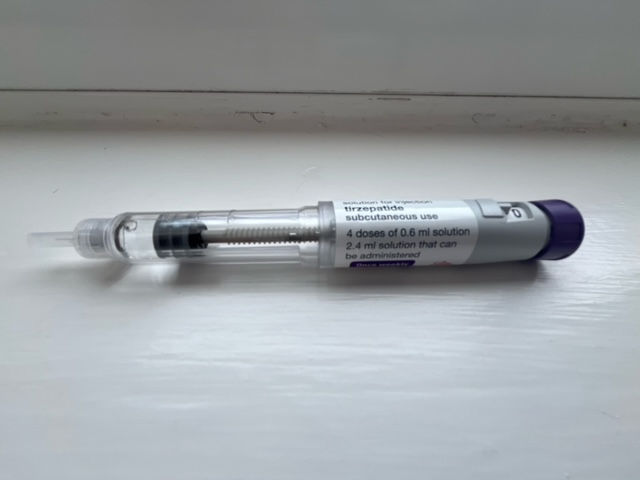Mounjaro... is it safe?
- Slim Transformation

- Jun 28
- 3 min read
Mounjaro has been in the news a lot this week. From the NHS rolling out the medication (if you're one of the lucky few to be able to access it - GPs swamped by requests for NHS Mounjaro – but hardly anyone qualifies).to potential side effects ranging from saggy skin to hair thinning to pancreatitis (causing the MHRA to launch a study into the medication.
Mounjaro (generic name: tirzepatide) is a prescription medication used to treat type 2 diabetes and weight loss. It works by mimicking two important hormones in the body that regulate blood sugar and appetite: GLP-1 (glucagon-like peptide-1) and GIP (glucose-dependent insulinotropic polypeptide). This dual action makes it different from other medications that target only GLP-1.

Here's how Mounjaro works:
Increases insulin production (when blood sugar is high):It stimulates the pancreas to release more insulin, but only when blood sugar levels are elevated, helping to lower blood glucose safely.
Reduces glucagon secretion:Glucagon raises blood sugar, so by suppressing its release, Mounjaro helps keep blood sugar levels more stable.
Slows gastric emptying:This delays how quickly food leaves the stomach, which flattens blood sugar spikes after meals and contributes to a feeling of fullness.
Suppresses appetite and reduces food intake:Acting on the brain's appetite-regulating centers, Mounjaro reduces hunger and cravings, which is key for its weight-loss effects.
Promotes weight loss:Many people taking Mounjaro lose a significant amount of weight due to reduced appetite and calorie intake, in addition to its effects on blood sugar.
Dosage and Use:
It’s a once-weekly subcutaneous injection.
Doses are typically started low and increased gradually to minimize side effects like nausea or vomiting.
Mounjaro (tirzepatide) is generally considered safe for many people when used as prescribed, but like any medication, its safety depends on the individual's health profile, risk factors, and how it's used. Here's a breakdown of its safety profile:
✅ Generally Safe For:
Adults with type 2 diabetes needing better blood sugar control.
People with obesity or overweight (often prescribed off-label) looking to lose weight under medical supervision.
Those without a history of pancreatitis, severe gastrointestinal disease, or certain endocrine conditions.
⚖️ Effectiveness for Weight Loss
Studies show remarkable weight loss, even among people without diabetes:
In trials (e.g., SURMOUNT-1), patients lost up to:
15–20% of body weight over 72 weeks
Comparable to or better than GLP-1s like Wegovy (semaglutide)
This makes it one of the most effective medical weight-loss treatments available.
⚠️ Potential Side Effects & Risks:
Common (Mild to Moderate):
Nausea, vomiting, diarrhea, constipation – usually improve as the body adjusts.
Reduced appetite – often intentional, but can lead to under-eating or nutritional gaps.
Fatigue or dizziness – especially early in treatment.
Serious (Less Common):
Pancreatitis – inflammation of the pancreas; seek medical attention if severe stomach pain occurs.
Gallbladder problems – gallstones or gallbladder inflammation may occur.
Kidney issues – mainly from dehydration due to vomiting or diarrhea.
Thyroid tumors – a risk seen in rodent studies (not confirmed in humans), including medullary thyroid carcinoma (MTC).
Low blood sugar (hypoglycemia) – more likely if combined with insulin or sulfonylureas.
❌ Not Recommended For:
People with a personal or family history of medullary thyroid carcinoma (MTC) or Multiple Endocrine Neoplasia syndrome type 2 (MEN 2).
Those with severe gastrointestinal disease (e.g., gastroparesis).
Pregnant or breastfeeding individuals (limited data; not recommended).
Long-Term Safety:
Still being studied. Trials so far show promising results for both diabetes control and weight loss, with manageable side effects.
Ongoing cardiovascular outcomes trials (like SURMOUNT and SURPASS) are evaluating long-term safety and heart-related benefits.
Conclusion:
Mounjaro is considered safe for most people when used under medical supervision, but it’s not a casual drug and requires careful monitoring, especially during dose escalation. This is why it is so important to provide the right information at your consultation and ensure your provider is checking in regularly with you.
If you have any concerns, let us know and we would be happy to help.




Comments